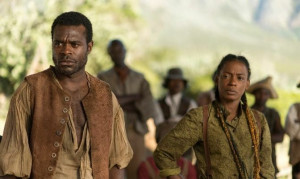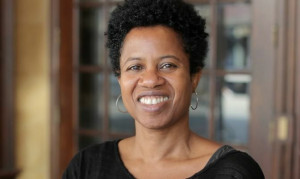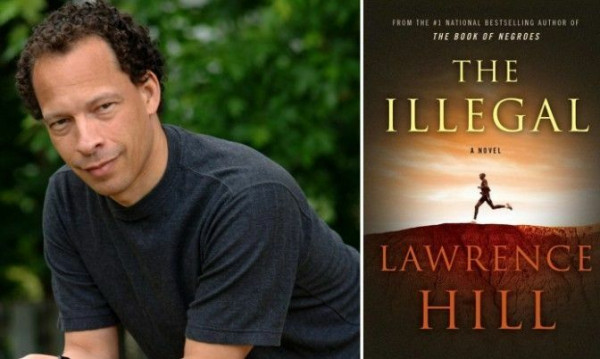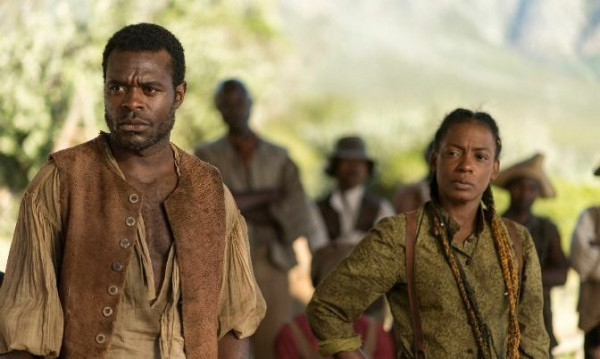In a rare feat his best-selling novel has been adapted for television in both Canada and the U.S. back to back. But he has found himself in the strange situation of having the original title ripped away due to public controversy, then unceremoniously returned during the TV adaptation process. Lawrence Hill opened up to ByBlacks.com about how he survived the entire experience, from his regrets to his victories.
How do you even begin to adapt such an enormous novel and story into a six part mini-series? How do you know what to cut?
Well, the first process was just to think about what parts of the story we would keep, and which would absolutely have to be effective in dramatizing; what parts of the story would just have to go, because it was just far too much. The first thing was to just sit for many days brain storming with the director and executive producer, then figure out how we would adapt it to screen. We needed to figure out which were the most important parts that we would -- come hell or high water at this point -- have to protect and what parts might just have to go. The big picture first.
I know you worked with Clement Virgo as co-writer, how much input or control did you have on what went into the mini-series?
As co-writer, I was involved from the beginning to the end. I mean let’s be honest, the writer has the least influence in terms of final project. People who have by far the most influence are the director and producers, and so you are sort of at the bottom at the totem pole of hierarchy when you are a writer; however, at least I was involved. I was involved from the beginning to the end in shaping this story, figuring out what we would dramatize, what we set would aside, and what new things we would put into the story that weren’t even in the novel. I was profoundly involved, and I had all sorts of opportunities in helping shape the story. But at the same time, I was part of a team of people, and I was the least senior person in that team.
You were on set for a lot of the filming, what did that experience feel like? What was the energy?
Oh, the energy was terrific! I mean it was a really beautiful example of international cooperation. We had South Africans, Americans, British, and Canadian men and women, children, and adults, professional actors and local extras all working together. It was a fascinating experience for me to watch the filming, to see the actors at work, and to be called into the process scene; instead of having to suddenly write quick lines of dialogue on the fly to satisfy the needs of an actor. It was a really fascinating process. I was honored to be a part of it, and I learnt a great deal. One night, I was an extra on a wide farm about an hour outside of Cape Town, I found myself standing beside a lot of ordinary people who had come to work as extras to get a few dollars. They had to stand out in the rain for hours to make money, and I got a glimpse of how difficult their lives were.
What was the hardest scene for you to watch?
Well, I guess watching Aminata see her parents get murdered. That was pretty tough. There were many scenes that were hard to watch. It was hard to watch her being thrown onto a slave vessel, and it was hard to watch her lose her babies. There were many things that were excruciatingly difficult. This is a woman who endures just about every insult to her humanity short of being murdered. She loses everything at one point or another in the course of her life. There is a lot that’s hard to watch. It was hard to write as a novel, and it was hard to watch on screen; but, there is much to love and much to be inspired by. This is a woman who won’t give up and insists on her own humanity, even as others try and fail to take it from her. I find that very inspiring.
After watching the entire mini-series, do you have any regrets about how anything was portrayed?
I am a realistic guy, and in every walk of life there are compromises. If you are a doctor operating on people’s hearts in emergency rooms, you are going to have to make compromises too. You will have to make compromises in terms of your access to the operating theatres and the politics of working in a hospital. Everybody faces compromises in their world: journalists, doctors, teachers, and of course writers do too. I would be lying if I was to deny that there were moments of frustration, compromise, and challenge in working as part of a team in adapting a complex problem to the screen; however, as a whole I was very delighted. I worked with great people: Clement Virgo, Damon Oliver, the actors, the producers, and crew. I believe that they were really committed to honoring the heart and soul of the story. I knew that selling the rights to my novel would be giving away the rights to control the final product, but it’s part of the reality of seeing your work adapted to screen. If you can’t handle the fact that things will change and that you won’t have control over the final project, then you shouldn’t be selling your story or you shouldn’t be involved with it. You have to realize that the world goes on and nobody will die, so to speak, if your story changes a little or a lot. I learnt a great deal, and I am really happy with the result. I wish it were a twelve-part instead of six-part miniseries, but that would take twice the money, and it would have been extremely hard to finance.
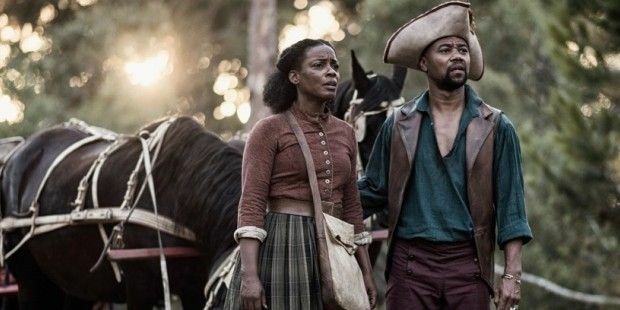
I think a lot of fans wished for a bigger series too, in fact I think a lot of people were really anxious to see it as a Hollywood movie. Was that a route you ever considered? What led to your decision to go with a TV adaptation?
The way it works is that you don’t really have complete choice about this as a writer. You can’t provoke someone’s decision to try to buy the rights to publish your novel into a movie or television series. You can hope that it will happen, but it’s only going to happen if someone wants it. Someone is going to have to raise millions and millions of dollars to make that kind of big capital that doesn’t come about very easily. And so, when you write a book, say a novel, you sort of sit around and wonder if anyone will come and offer to buy the rights to develop this as a film or mini-series. Nothing happened for a couple of years until finally three or four years after the book came out, Clement Virgo and Damon Oliver offered to option the right to develop the book into at first a feature film, and so I’ve sold the right to do that. It was contingent on whether somebody else wanted it, and as it turns out somebody did, so I was very lucky. Of course, I could have said no. I did say no to two earlier offers because they didn’t seem very interesting, and they didn’t seem to be coming from people who’d know how to do it, but when Clement and Daman came along, I said ‘yes’ because I believed they would do a very good job.
The first step is just to wait and see if somebody is going to offer. And again as a writer, you can’t provoke that, you can’t incite that. It’s really up to somebody else to make that offer and to approach you or your agent and see if you’d like to sell the rights. Once I got a good offer and knew that I’d like to go forward, it was very exciting! I mean, what writer wouldn’t? Many writers hope that their work will reach the broadest audience possible. Only some people will read a novel especially a literary novel like mine, but other people who might not read a novel, might watch a movie on TV. I think that is the highest compliment. Plus, it gave me a chance to acquire a new set of skills to co-write the mini-series, and writers have to be adapting and learning new skills. I am a full-time writer, and this is my only job; as a result, I need to sort of take advantage of opportunities to make a living, to make money, and also to develop my own skills. This gave me a chance to earn an income, and also to learn a whole new way to work, which is to write a screenplay. It is a really great opportunity for me, so I just jumped.
You’ve said that you learnt a great deal during the making of the mini-series. Could you give me an example of something you learned?
In the novel, a major character dies offstage, and we learn of his death, but we don’t see him die. Aminata learns of his death second hand. One of the first things I learned in adapting a novel to the screen, is that you can’t kill a major character offstage when you are writing for television. If someone important in the mini-series is going to die, we the viewer have to see him die. We have to see how and when he dies, and who kills him. His death had to happen while we watch. I had to adapt and rewrite the story for screen so that this character’s death can be seen, rather than heard about offstage.
Another thing I learned was that in the novel as Aminata travels around the world, people drop in and out of her life, but in a television mini-series you need more continuity of the minor characters. Therefore, there have to be fewer characters because there is not enough room in a mini-series for all the characters in the novel. The characters that are there have to stick around a little longer and have a longer shelf life, a longer time to cohabit with Aminata on the screen. So fewer characters, but they have to hang out with her for a long time.
How do you feel about mainstream media coverage of the series so far?
It’s been very good. When you are fortunate to have a novel or a mini-series that attracts a huge amount of attention, it is only nature that some people will love it and other people might hate it. One of the facts of life of being an artist is that you have to sort of accept it. Some people will like what you do, and other people won’t. If you are going to accept some praise, you also have to sort of accept a little bit of criticism. Some people don’t like it, and that’s to be expected, but other people seem to really love it, and for the most part viewers and the media. The mainstream media seem to have been very positive and kind. There have been some complaints and some negative reviews, but there have been far more positive articles and reviews than negative. Any art that attracts millions of viewers is going to have at least some people who dislike it, and we all have a right to dislike things just as we have a right to like them. I respect that. It would be too much to ask that something that millions of people are watching while it’s broadcasting on televisions around the country, in homes and around the country, would please everybody. That is just unrealistic. I used to be a journalist and there were things I liked, and other things I didn’t. That’s just part of the world of engaging with the arts.
Initially the U.S. version of the book was called Someone Knows My Name… as it was felt the word Negroes would anger Black activists. How did you feel when the title was changed?
What happened in the States was that the American publisher W.W. Norton was planning to publish it as The Book of Negroes, but at the last minute changed its mind because it was getting messages that American bookstores would not order the book with the word Negroes on the title. They backed off their decision to publish it as The Book of Negroes and chose to publish instead -- at the last minute -- the title Someone Knows My Name. How did I feel? Well, I was frustrated. Any writer would be frustrated, but I also took comfort in the fact that many Canadian, British, and Australian writers see their titles change entering the American market. It happened to Alice Munro, our Novel Prize novelist and her beautiful collection of stories Who Do You Think You Are as it changed names when entering the American market. It is not uncommon that this should happen to Canadian, Australia, and British writers, and it happened to me too. I am in good company, but it was frustrating. I had to learn to live with that as I had no choice in the matter, except to come up with my own secondary title which was Someone Knows My Name, but now there is a mini-series that’s coming out in the States with BET as The Book of Negroes. This has stirred my American publisher to re-issue the novel as The Book of Negroes. As of last month January, the novel is available in the States as The Book of Negroes. So, it is a delicious irony of how television decisions are influencing publishing decisions in New York, but thankfully the book is now finally available in the States as The Book of Negroes.
The book was also publicly burned by a Dutch Black organization because they also felt the word Negroes was offensive. Did you ever anticipate the title would get that kind of reaction?
No. I want to be clear about something. I was brought to the Netherlands by a prominent Black Dutch organization -- they are an organization of people of Surinamese descent -- who welcomed me with open arms, and they had me on a day long set of events of reading, a lunch, and a conversation of question and answer period. I was totally welcomed by the Black community in the Netherlands; however, a few days after I left the Netherlands – where the novel was a best-seller by the way, and well received in the media and by buyers on the whole – a small group of Dutch Surinamese activists had a different attitude, and that was that they were offended by the title because the word Negroes appears on it. They refused to read the book with the words Negroes in the title or to discuss why I called it The Book of Negroes -- which had obvious historical roots, and they decided to burn copies of the cover across Amsterdam. I received a threatening email to the effect of “Dear Sir, I intend to burn your book”. My publisher’s life was threatened and copies of the book covers were burned while television cameras rolled in the Netherlands. I was very unhappy about it. It was an attempt to intimidate me and my publisher; I don’t take kindly to having people intimidate me for exercising my right as a writer and a novelist. I wrote a book about the experience called Dear Sir, I Intend to Burn Your Book, in which I tried to come to terms with the motivations of the book burner, and with the notions of freedom of speech and notions about the history of racism and slavery in the Netherlands.
You got a chance to see the actual Book of Negroes document, what was that like for you?
I was delighted to see it! I had seen electronic copies and physical copies of the original. I had seen copies all over the place before. I’d seen copies in the New York Public Library, The Nova Scotia Public Archives, and the International Archives of Canada. I’d seen copies online, photocopies in various research centers, so I knew what it looked like. I had studied it thoroughly. I knew everything I could know about The Book of Negroes document, you know. This is the document that the British Navy kept to record the exodus of three thousand Blacks from Manhattan to Nova Scotia. I knew about this document and had studied it inside out, but I had never seen the original. I was invited to Buckingham Palace to meet the Queen, and the day after that I went to see the original which is in the National Archives of the UK in a place called Kew Gardens, I think it was. It was thrilling! It was amazing to touch this musty old hundred and fifty page ledger, then turn the pages and see all these details that I had been studying for years. It was really thrilling to see and touch. It was one of the most special moments of my life!
The success of the book and the mini-series could well be considered the biggest success in Black Canadian historical storytelling. Why do you think we hear and see so little about Canadian slave history?
Well, it’s not just Canadian slave history, but it’s black history which has much to do with things outside the notion of slavery – like The Book of Negroes story and mini-series. Aminata is only a slave for a tiny portion of her life and for a tiny portion of the book and for a very small portion in the mini-series. For most of the book, the mini-series, and for most of her life, she is free. And so it’s not just a novel and mini-series about slavery, but it is about a woman’s life, and about her resilience as she moves along the planet sometimes voluntarily and sometimes involuntarily.
I think Canadians are happily ignorant, willfully quintessentially ignorant about our own history. We just don’t know of the painful, difficult thing such as slavery in our own backyard, and we prefer to talk about American slavery or about apartheid in South Africa. It’s paradoxical that we know more about American slavery than we do about Canadian history and the ending of slavery in our own land. I guess, it’s some moral comfort pointing our accusatory finger at our neighbors, but it doesn’t help us understand ourselves or to really move forward with a grounded knowledge of who we are as Canadians. I didn’t write the novel or co-write the mini-series to point fingers, or to point blame, and or to make people feel guilty; I am not interested in guilt or blame in writing. I am into sort of dramatizing exciting important known and unknown aspects of black history in Canada and around the world. I think that when Canadians are given a chance to learn about these things either through reading the novel or seeing the mini-series, then they get interested, and they say to me over and over, ‘How come I didn’t learn about this when I was twelve years old in grade six or fourteen years old in grade eight?’ ‘Why haven’t I heard of The Book of Negroes as a document in the British Naval register before I came to this work of art?’ Canadians do want to learn the story; they just have to be led to it.
What would you say to people who think, “we don’t need any more slave movies.” It’s a common opinion held among Black people who aren’t fans of “reliving the history.”
What would you say if somebody said “we don’t need any more love movies?” “We don’t need any more movies about war?” “We don’t need any more movies about unhappiness?” I would say that as long as we have artists, scholars, and historians, we are going to have people who are trying to make sense of some of the great moments and some of the great disasters in history. And so, if humanity continues the way it has, as long as I’ve known anything about it, our own children, grandchildren, and great grandchildren will also be making movies, or will be writing novels about the Holocaust, or the Genocide in Rwanda, or the wars of Former Yugoslavia, and or the war about the Transatlantic Slave Trade. Why shouldn’t they? This is our history. This is our life. This is our humanity. And we need to come to terms with it. Every generation seeks to come to terms with history, with our society, with our blemishes, with our failures, and our successes, so why shouldn’t our great grandchildren be mediating in their own way/with their own confidence of human history as we do today and or as our grandparents did generations ago? I would say to anyone who says, ‘we don’t need any more of this,’ well first of all, you don’t have to watch it, and you don’t have to read it if you don’t want to. Second of all, I would say what do you think artists do? Artists look, discover the moments of human experience, and try to dramatize them so that we learn more about ourselves and understand ourselves more deeply. So, to say we don’t need any more of it makes no sense.
What’s next for you? Have you been bitten by the screenwriter bug?
I have been bitten by the screenwriter bug. I’d like to write more screenplays, absolutely. I think it is fascinating and interesting. So, yes I would like to write more screenplays, but my fundamental orientation as a writer is to write novels in non-fiction, novels of specialty. I am just finishing up right now, a new novel, and am really looking forward to bringing that out hopefully at the end of this year or early next year.
For more information on Lawrence Hill visit: www.lawrencehill.com.
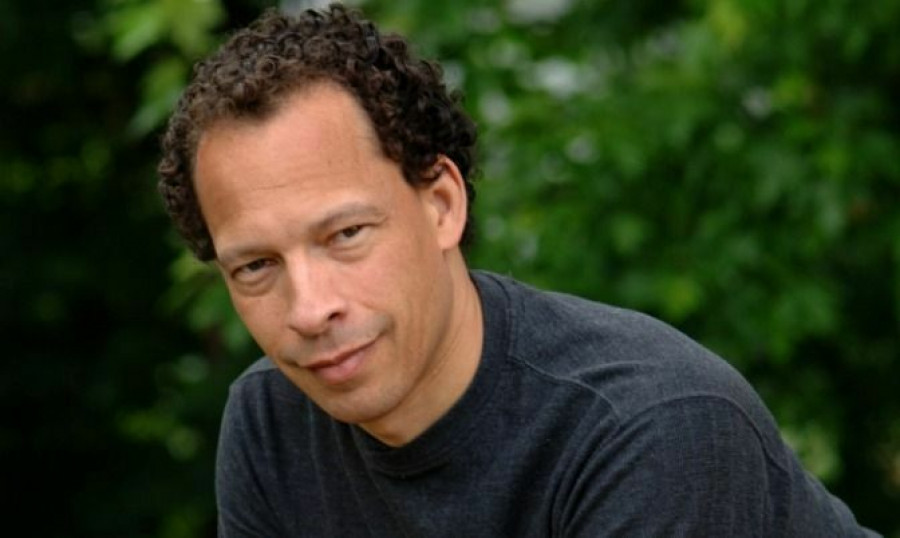
 By
By 

